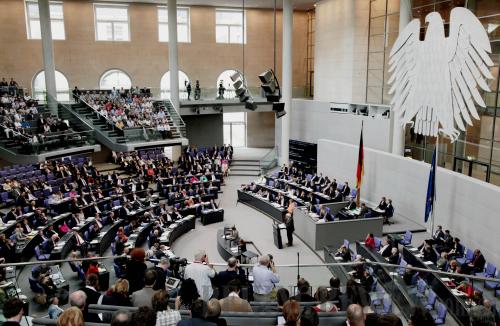|
 |
|
LENDING A HAND: German parliamentarians attend a special session of the lower house of Germany's parliament, in Berlin on July 19, which approved a rescue package of up to 100 billion euros ($122 billion) for struggling Spanish banks (PAN XU) |

While most of Europe goes on holiday or sits glued to the London Olympics, the euro sovereign debt crisis continues to preoccupy policymakers. In the last week of July, it appeared as if the crisis had reached Olympian proportions as the Spanish Government looked set to follow its banks and seek a bailout from the EU. Dealing with Greece is one problem. Dealing with Spain, and potentially Italy, are problems of a vastly different dimension. As rumors grew of a Spanish bailout request, markets fell and the euro dipped against the dollar.
Super Mario
But then Mario Draghi, President of the European Central Bank (ECB), spoke out and calmed the markets. In a speech in London, he said the ECB "is ready to do whatever it takes [within our mandate] to preserve the euro. And believe me, it will be enough."
Investors were suitably impressed by "Super Mario." Spanish and Italian sovereign bond yields, which had risen to a dangerous level, dropped back, and stock markets recovered as did the euro.
German Chancellor Angela Merkel and French President Francois Hollande also issued a joint statement emphasizing that they were "deeply committed to the integrity of the euro zone" and were determined to do everything to protect it.
So calm reigned again, at least for a few days. When the ECB held its monthly meeting on August 2, many commentators had assumed that Draghi would announce the ECB was going to start buying government bonds. But under pressure from Germany, Draghi was forced to soften his rhetoric and said that the ECB would only intervene once governments in trouble had availed themselves of the EU's rescue funds. Such steps by governments were "necessary conditions" for the ECB to begin its own bond purchases.
Draghi's promise of further support but no immediate action led to a repeat fall of European and global stock markets and the euro. So are we to witness another summer of concern over the euro?
The problem is that markets do not believe that EU leaders are really getting a grip on the problem. There have been over 20 summits of EU leaders since the collapse of Lehmann Brothers in 2008. After each summit there is a brief market rally, and then the doubts set in again.
Some experts argue that the deal agreed at the June European Council to boost the euro bailout fund to 500 billion euros ($615 billion) already looks too little, too late. Greece, Ireland, Portugal and Cyprus have all drawn on the stability fund and there is mere 160 billion euros ($197 billion) left in the kitty. In July the Spanish banks were bailed out. Fears that the looming bankruptcy of several regional governments in Spain could force Madrid to seek a massive bailout from the EU led the Moody's ratings agency to downgrade even Germany to a negative rating, fearing that Europe's largest economy will have to pick up most of the burden.
German concerns
In Germany there is a growing reaction against any more bailouts. The most strident opposition comes from within Chancellor Angela Merkel's own governing coalition. German Economics Minister and Vice Chancellor Philipp Roesler publicly voiced his skepticism that Greece would be able to meet its obligations in order to access further bailout funds. He added that "the horror of such an event" had faded a long time ago.
The official EU line is that Greece should do everything possible to stay in the euro zone. Jose Manual Barroso, President of the European Commission, visited Greece at the end of July urging Greece to move ahead with the austerity program. He said actions were more significant than words and he wanted to see "results, results, results." A group of officials from the EU, the IMF and the ECB also visited Athens to monitor progress.
| 